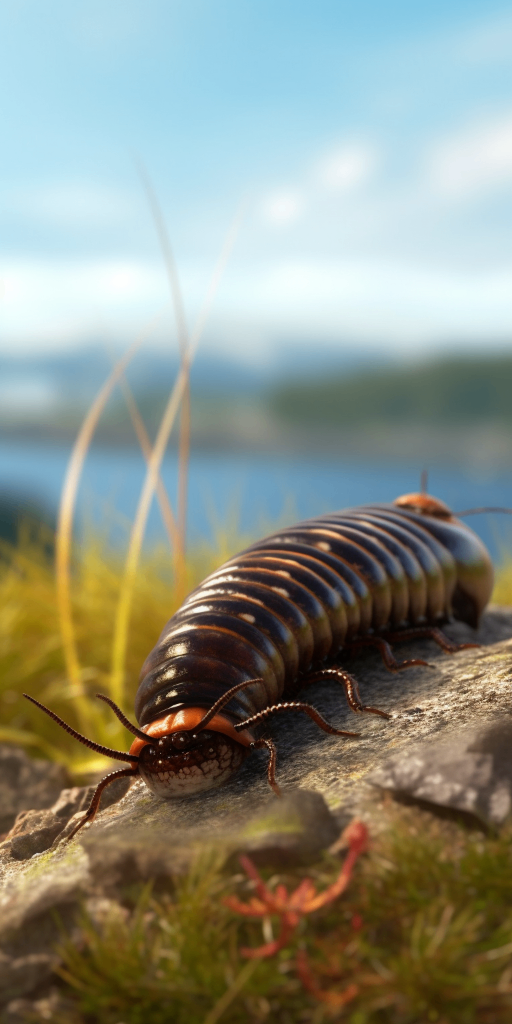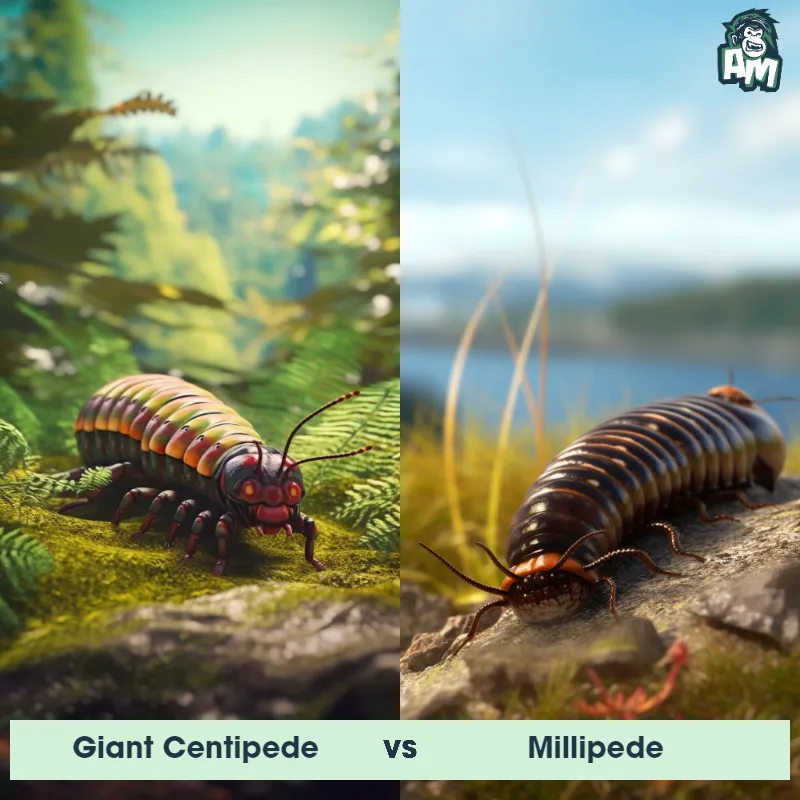The Millipede
The Millipede is a fascinating arthropod that belongs to the class Diplopoda. Known for their numerous legs, they can have anywhere from 30 to 400 legs depending on the species. These tiny creatures have a long and cylindrical body segmented into multiple sections, each housing a pair of legs. Their exoskeleton is typically dark-colored, providing them with protection against predators. Millipedes also possess tiny, simple eyes and a pair of antennae, which they use for sensory perception. One interesting characteristic of millipedes is their ability to release a defensive liquid when threatened, which can be irritating to predators or humans.

| Millipede | |
|---|---|
| Size | Up to 1 foot (30.5 cm) |
| Weight | 0.07 to 9.6 ounces (2–272 grams) |
| Speed | Speed: 0.03 mph (0.05 km/hr) |
| Key Strength | Curling into a tight ball for protection |
| Biggest Weakness | Slow movement and lack of offensive capabilities |
| Scientific Name | Diplopoda |
| Family | Various |
| Habitat | Moist environments such as forests, deserts, and caves |
| Geography | Worldwide |
| Diet | Decaying plant matter and sometimes small insects |
| Lifespan | 1 year - 10 years |

The Millipede
The Millipede is a fascinating arthropod that belongs to the class Diplopoda. Known for their numerous legs, they can have anywhere from 30 to 400 legs depending on the species. These tiny creatures have a long and cylindrical body segmented into multiple sections, each housing a pair of legs. Their exoskeleton is typically dark-colored, providing them with protection against predators. Millipedes also possess tiny, simple eyes and a pair of antennae, which they use for sensory perception. One interesting characteristic of millipedes is their ability to release a defensive liquid when threatened, which can be irritating to predators or humans.
Fun Fact: One fun fact about Millipedes is that despite their name, they do not actually have a thousand legs as their common name suggests. The number of legs can vary greatly, and while some species can have hundreds of legs, no species has been found to have exactly one thousand.
| Millipede | |
|---|---|
| Size | Up to 1 foot (30.5 cm) |
| Weight | 0.07 to 9.6 ounces (2–272 grams) |
| Speed | Speed: 0.03 mph (0.05 km/hr) |
| Key Strength | Curling into a tight ball for protection |
| Biggest Weakness | Slow movement and lack of offensive capabilities |
| Scientific Name | Diplopoda |
| Family | Various |
| Habitat | Moist environments such as forests, deserts, and caves |
| Geography | Worldwide |
| Diet | Decaying plant matter and sometimes small insects |
| Lifespan | 1 year - 10 years |
Millipede Matchups
We use AI to simulate matchups between the Millipede and other animals. Our simulation considers size, strength, and natural predatory behaviors to determine the most likely outcome.

Can't find the Matchup you want?
Create Your Own MatchupMillipede: Diet, Predators, Aggression, and Defensive Behaviors
What do Millipedes eat?
Millipedes primarily feed on decaying plant material, such as leaves, wood, and other organic debris. Some species also consume fungi and moss. They play a crucial role in breaking down and recycling dead plant matter, helping to enrich the soil.
Do Millipedes have any predators?
Millipedes have several predators in their natural habitat, including birds, small mammals, centipedes, amphibians, and some species of invertebrates. Some predators, like birds and shrews, have developed resistance to the defensive toxins produced by millipedes.
Are Millipedes aggressive?
Millipedes are not aggressive creatures and will typically try to avoid confrontation with other animals. They are primarily scavengers and are more focused on finding food and breeding rather than actively seeking out encounters with potential threats.
Do Millipedes fight?
Millipedes do not engage in physical fights or aggressive interactions with other creatures. Instead, they rely on their defensive mechanisms, such as curling up in a tight spiral or secreting toxins, to protect themselves from predators.
How do Millipedes defend themselves?
Millipedes have several defense mechanisms to protect themselves from predators. They are known to curl up into a tight spiral when threatened, presenting a hard, armored exoskeleton as a barrier. Additionally, many species of millipedes secrete toxic chemicals from special glands on their bodies, deterring predators with an unpleasant taste or smell.
What is the biggest weakness of Millipedes in a fight?
The biggest weakness of millipedes in a fight is their slow movement and lack of agility. While their hard exoskeleton and defensive toxins are effective in deterring predators, they are not well-equipped for quick or evasive movements. This makes them vulnerable to faster and more agile predators that can outmaneuver them in a confrontation.
Fun Fact: Millipedes are more closely related to lobsters and crabs than to insects, even though they may resemble insects at first glance. They belong to the group Myriapoda along with their close relatives, the centipedes, and are part of a separate lineage from insects, spiders, and scorpions.
Fun Fact: Many people often confuse millipedes with centipedes. However, one key difference between the two is that millipedes have two pairs of legs per body segment, whereas centipedes have one pair. This distinction helps in differentiating the two arthropods and understanding their unique characteristics and behaviors.











